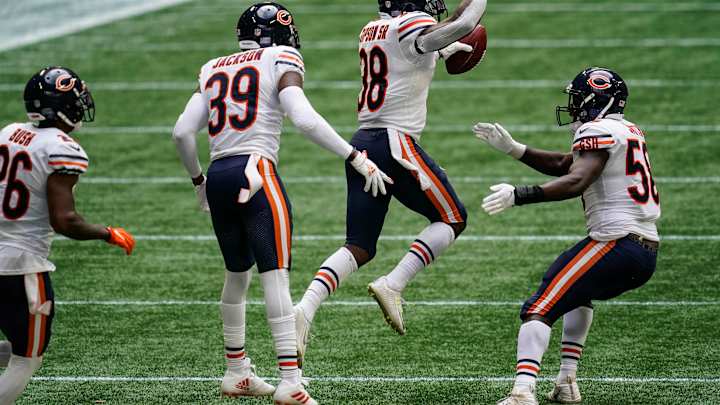Are Bears Lucky, Good, or Does It Even Matter in This Year's NFL?

It's a good thing Tashan Gipson wore a dew rag after Sunday's 30-26 win over Atlanta.
"This one was a little more extreme than Week 1, man," Gipson said, laughing, after Sunday's win. "When I signed up here I didn't know I was going to be aging.
"I'm getting some gray hairs here man, so that's probably under my dew rag."
The Bears are living proof it's better in the NFL to be lucky rather than good. They've gotten by three times by the skin of their teeth and it's earned them little respect from the national "experts."
Before thinking about a big game in Tampa in February, if that's even possible in the COVID-19 envrironment, consider where the Bears have traveled over the last three weeks.
They've started against three opponents with a combined record of 1-8.
Bears are 3-0. They won't win more than 8 games. And are stuck in draft pick purgatory from trades they've made. Rough spot to be in
— Jason La Canfora (@JasonLaCanfora) September 28, 2020
A team can't do much about the schedule beyond playing the next week's game, but ultimately soft schedules have a way of revealing a team's true identity at a later point. The Bears play seven of their final nine games against last year's playoff teams. They're playing a strong opponent this Sunday at Soldier Field.
The easy touches appear to be over at this point. Even rebuilding Carolina looks tougher than before the season.
Then again, the two teams facing the easiest schedules in the league this year are Baltimore and Pittsburgh based on their strength of schedule. Baltimore's opponents had a .437 strength of schedule last year and Pittsburgh's .457.
No one is accusing the Steelers or Ravens of being pretenders because of their schedules.
As for the seven games in nine weeks against playoff teams, the Minnesota Vikings are in there and hardly look like the team which beat New Orleans in last year's playoffs. The Houston Texans look much less formidable as well.
As the weeks go by in the NFL, reputation built on the past tends to break down every year. The schedule may not be as difficult at the end as it once looked.
Part of the reason for considering the Bears fortunate to date is the way injuries have impacted each game.
No Kenny Golladay for Detroit in the opener. The Lions were without one defensive back and lost a few more in the game.
In Week 2 the Giants lost Saquon Barkley in the first half to a torn ACL. Their second-best wide receiver, Sterling Shepard, went out with an injury then, as well.
In Week 3 it was no Julio Jones for Atlanta due to injury. The Falcons had two key defensive backs injured and then another wind up on the Reserve/COVID-19 list. They played without tackle Kaleb McGary to block Khalil Mack, and late in a crucial part of the game they had their best defensive player, Grady Jarrett, leave the field with an injury.
The Bears? Until Tarik Cohen's torn ACL, they had only Mack's weekly questionable status due to a knee injury never clearly defined, and it's one which apparently doesn't affect him much. Robert Quinn was back by Week 2 from an ankle injury and quickly fit right into the lineup.
So the injuries have favored the Bears and other teams have been decimated?
No one threw a pity party for the Bears last year when they endured playing without Akiem Hicks for what essentially was 12 full games. Losing Roquan Smith and Danhy Trevathan in the season's second half caused no opponents to take out the hankies.
Injuries are part of the deal in the NFL. You have them. You don't. Other teams have them, and sometimes they don't.
It's why depth counts for so much in the league every year
Bears opponents might go on suffering injuries all year long. There's no way to know this. It's doubtful but possible.
All they can do is play whoever is put in front of them, just like the schedule.
Manpower and schedules aside, the Bears have won in the flukiest manners. No one in league history had come back from a 16-point deficit or more in a fourth quarter to win two times in a season until the Bears did it for the second time in three weeks against Atlanta.
Both were on the road, but in this year's NFL there is very little significance to home-field advantage with noise produced by recording.
"Obviously it's just a win is a win," Gipson said. "These are hard to come by."
Rallying to defeat struggling opponents with comebacks for the ages sure beats the snot out of losing those games.
The Bears under Nagy have had problems beating opponents when they get into a high-scoring, back-and-forth game. The four losses they suffered against Green Bay, Miami, New England and the New York Giants in 2018 all fit that same category. Last year the only high-scoring shootout on the record was the 31-24 win over Dallas but they totally outclassed the Cowboys 31-14 until two Dallas touchdowns in the last 4 1/2 minutes.
The Bears are learning to spar and to come back to win.
"We are not afraid to have our backs against the wall," Hicks said. "Do we want to be in situations in the fourth quarter where we need a score in order to win? We don't want that all the time. But over the course of a football game, you find yourself in that position and you have to be able to fight out of it.
"I think that one of the characteristics of our team that makes us special is that we are not afraid to compete."
There's more involved here than luck.
Combine it with the willingness to compete and lofty goals are possible.
Twitter: BearDigest@BearsOnMaven
